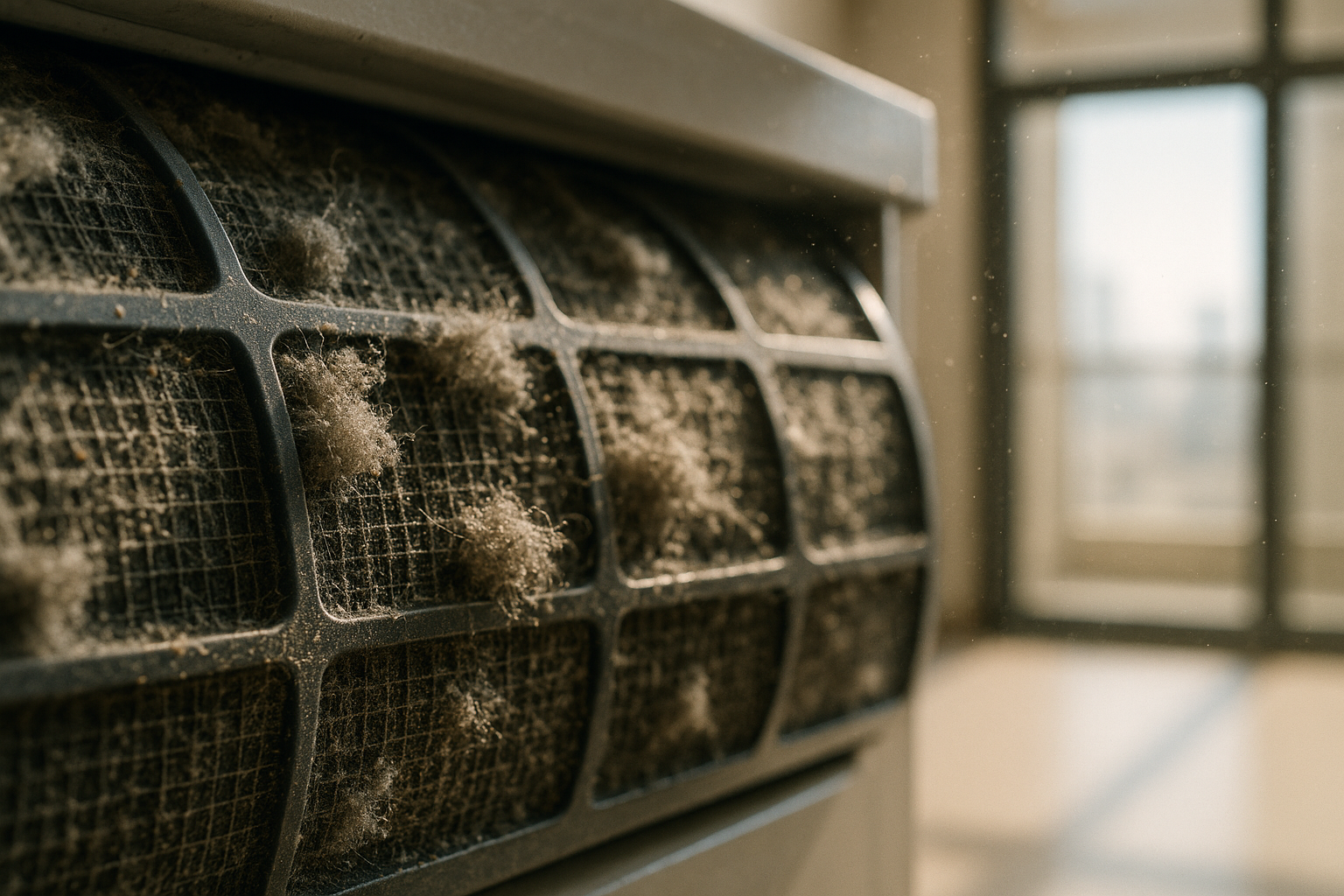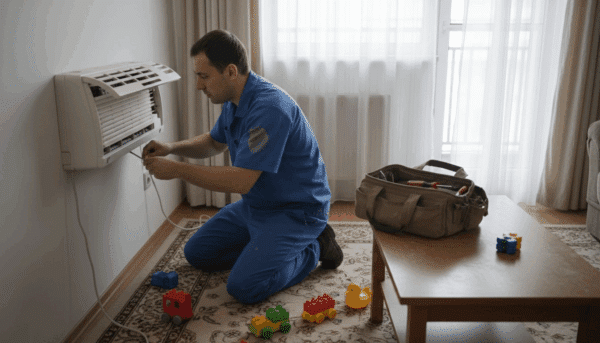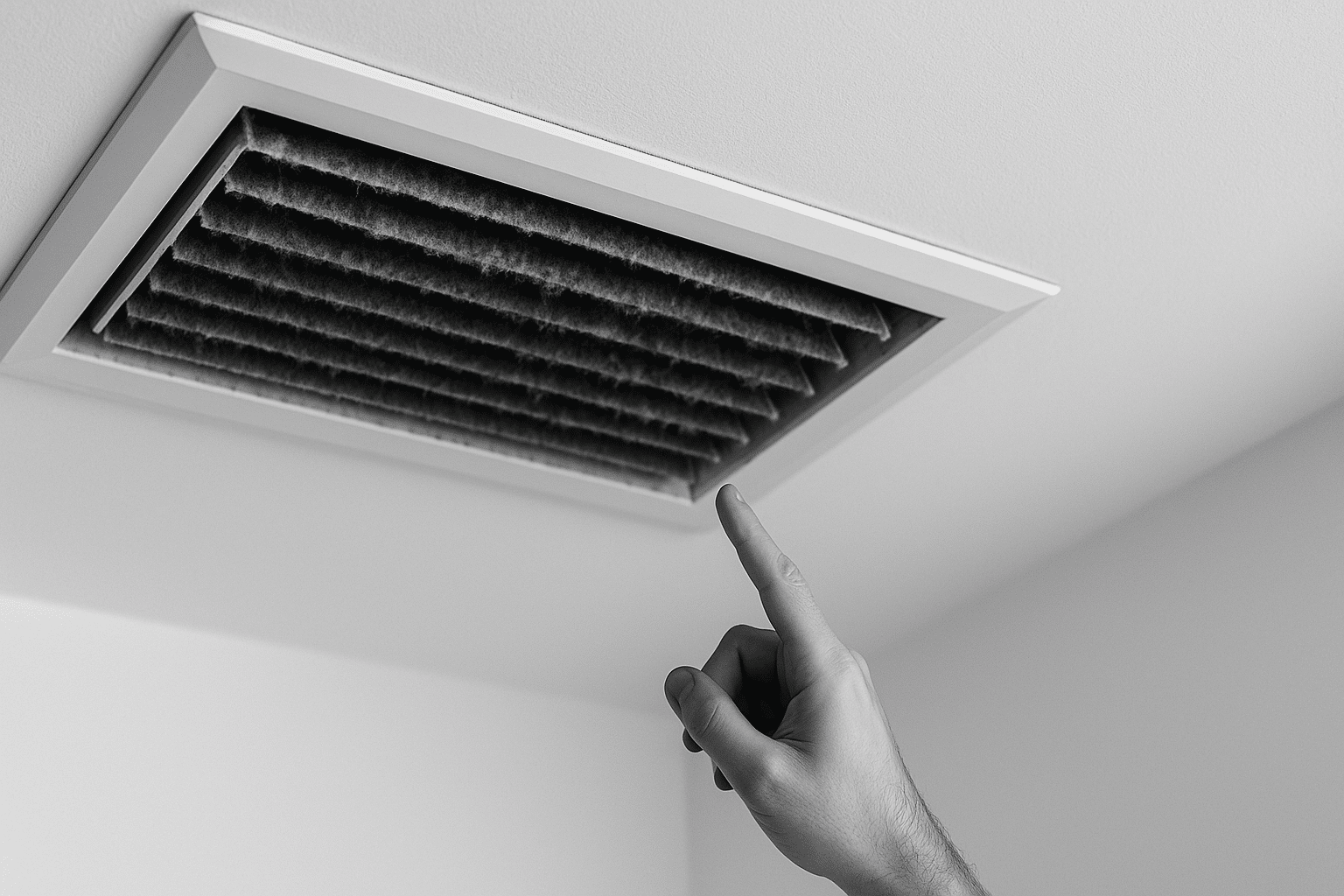
How Dust Affects AC Performance and Indoor Comfort
Dust is one of the most overlooked factors that can reduce the performance and efficiency of your air conditioning system. In regions like Dubai and the UAE, where dust storms and fine sand are common, AC units face constant exposure that directly impacts both cooling ability and indoor air quality. Homeowners who want a comfortable and healthy home environment must understand the connection between dust, energy efficiency, and overall system performance.
This guide explains how dust affects AC performance, what warning signs to watch for, and how professional maintenance and disinfection services can help keep your home safe and energy bills manageable.
Why Dust Build-Up Reduces AC Performance
Dust does not just settle on visible surfaces. It collects deep within filters, coils, and ductwork, which restricts airflow and forces the system to work harder. This hidden buildup often leads to:
- Reduced cooling efficiency – The AC struggles to maintain the desired temperature because blocked airflow prevents proper circulation.
- Increased energy use – A clogged system consumes more electricity, resulting in higher monthly bills.
- Shortened equipment lifespan – Components such as fans and compressors wear out faster when under constant strain.
In Dubai, where summer AC usage is nearly continuous, even a thin layer of dust can push energy consumption noticeably higher. Keeping your system clean is about protecting your investment and reducing long-term costs.
Alt Text: Close-up view of dust and sand particles coating a metallic air filter inside a sunlit Dubai apartment, highlighting accumulated debris, intricate mesh details, and urban pollution. Sunlight from a glass window emphasizes dust motes and creates a soft, atmospheric background.
Common Signs of Dust Problems in Your AC
Early detection helps avoid costly repairs and poor air quality. Watch for these signs that dust may be limiting your AC’s performance:
- Weak airflow from vents, even when the system is on full power.
- Rising energy bills without any noticeable change in usage.
- Unusual odors, such as musty or stale air when the unit runs.
- Increased dust inside rooms despite frequent cleaning.
- Noisy operation, including rattling or whistling from clogged parts.
- Worsening allergy symptoms among family members.
If you notice several of these symptoms, the system likely needs more than a basic cleaning. Professional servicing ensures the entire unit, including hidden ductwork and coils, is restored to peak efficiency.
Energy Efficiency and the Cost of Dust
One of the most direct ways dust affects AC performance is through energy use. When airflow is blocked, the system compensates by running longer cycles and consuming more electricity. This raises costs month after month.
For example, a clogged filter can reduce efficiency by as much as 15 percent. That may not sound like much, but in a hot climate with constant usage, it can add up to hundreds of dollars annually. Regular filter changes and deep cleaning are cost-saving measures that pay for themselves over time.
Why Traditional Cleaning Isn’t Enough for Dust Buildup
Many homeowners believe wiping surfaces and replacing filters is sufficient. Unfortunately, dust often harbors bacteria, mold, and volatile organic compounds that basic cleaning cannot eliminate. This is where professional disinfection and advanced indoor science make a difference.
- Traditional methods: Remove visible dust but leave behind hidden particles and microbes.
- Advanced disinfection: Uses specialized treatments to sanitize coils, ducts, and vents at a microbial level.
- Result: Cleaner air, better energy efficiency, and a healthier home environment.
Companies with dedicated indoor science research, like Saniservice, focus on long-term solutions rather than surface-level fixes.
Practical Maintenance Tips for Homeowners
While professional servicing is essential, there are steps you can take at home to reduce dust buildup and keep your AC running smoothly:
- Replace filters regularly – Every one to three months, depending on usage. Choose high-efficiency filters such as HEPA or electrostatic models.
- Check vents and registers – Ensure they are not blocked by furniture or decor.
- Clean grills and surrounding areas – Wipe and vacuum around units to prevent recirculation of dust.
- Seal duct leaks – Cracks and gaps can pull in extra dust from attics or walls.
- Monitor indoor air – Use an air quality sensor to track dust levels and identify when maintenance is needed.
- Schedule professional servicing – At least twice a year for deep cleaning and disinfection.
By combining consistent DIY care with expert inspections, homeowners in the UAE can extend the life of their AC while enjoying cleaner air.
The Long-Term Benefits of a Dust-Free AC
Investing in regular maintenance and professional disinfection offers long-term advantages:
- Lower electricity bills due to improved efficiency.
- Extended equipment lifespan, saving money on replacements.
- Healthier indoor air that reduces allergy symptoms and improves comfort.
- Peace of mind knowing your system is scientifically treated for hidden contaminants.
A dust-free AC system means more than just cooler rooms. It is an investment in your home’s health, efficiency, and sustainability.
Ready for Clean Indoor Air?
If you want reliable cooling, lower energy costs, and a healthier home environment, now is the time to act. Schedule a professional assessment and disinfection service designed for Dubai’s dust-heavy conditions. Protect your AC system and your family’s well-being today. Take the first step toward fresher air, reduced energy waste, and long-lasting comfort by booking a tailored service plan. Don’t wait until rising bills or poor air quality become unavoidable problems. Reach out to Saniservice now and experience the difference expert care and advanced technology can make in your home.






Leave a Reply